You found our list of top conflict resolution books.
Conflict resolution books are guides that teach readers how to navigate interpersonal issues. These works cover topics such as mediation, negotiation, communication, and de-escalation. The purpose of these books is to help professionals overcome disagreements and personality clashes, build trust, and practice better teamwork.
These works are similar to books on problem solving, communication books, negotiation books, management books, and leadership books. These guides include conflict resolution activities.
This list includes:
- books on conflict resolution in the workplace
- conflict resolution books for managers
- negotiation and conflict resolution books
- peace and conflict resolution books
Here we go!
List of conflict resolution books
From new releases to classic bestsellers, here is a list of books on conflict resolution to help navigate issues in the workplace.
1. Crucial Conversations: Tools for Talking When Stakes Are High by Kerry Patterson, Joseph Grenny, et al
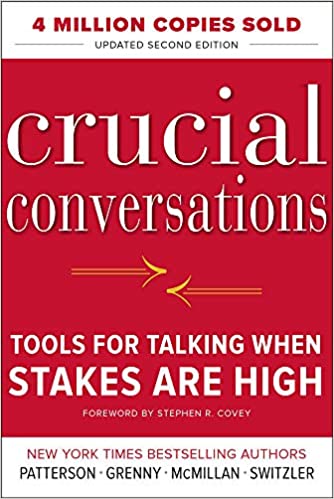
Crucial Conversations is a guide to having tough discussions. The book demonstrates how to control impulses and retain composure during emotional exchanges. This guide explains how to start or approach these conversations, how to keep calm in the moment, and how to steer the discussion towards a productive end. The authors suggest techniques for making all parties feel comfortable and psychologically safe, and for reaching a resolution that satisfies all involved. For example, “speak persuasively, not abrasively,” and “stay focused on what you really want.” The book contains anecdotes that show these tactics in action. Crucial Conversations is the ultimate communication guide for conflicts.
Notable Quote: “When conversations turn from routine to crucial, we’re often in trouble. That’s because emotions don’t exactly prepare us to converse effectively. Countless generations of genetic shaping drive humans to handle crucial conversations with flying fists and fleet feet, not intelligent persuasion and gentle attentiveness.”
Read Crucial Conversations.
2. The Anatomy of Peace: Resolving the Heart of Conflict by The Arbinger Institute
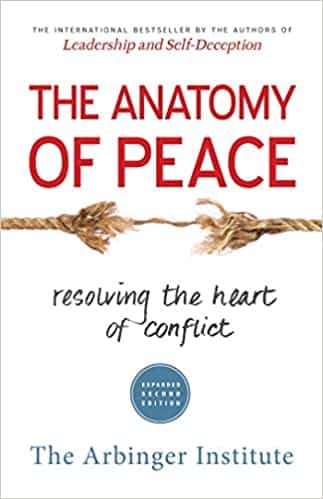
The Anatomy of Peace is one of the all-time best peace and conflict resolution books. This work centers on the causes of conflict and argues that by understanding the driving forces behind disagreement, participants can arrive at a more fulfilling solution. The text urges readers to examine the undercurrents of crisis, look internally and be self-aware, reach the real root of the upset, and proceed towards peace. The authors deliver reflections on the nature of conflict and human behavior in the midst of crisis. The book draws on real-world examples, including global conflicts, and offers practical advice on how to approach situations without fueling further tension.
Notable Quote: “Most wars between individuals are of the ‘cold’ rather than the ‘hot’ variety—lingering resentment, for example, grudges long held, resources clutched rather than shared, help not offered. These are the acts of war that most threaten our homes and workplaces.”
Read The Anatomy of Peace: Resolving the Heart of Conflict.
Want some free team building tools?
$49 value (100% free)
- 100+ fully tested icebreaker questions
- 24+ themed Bingo generators
- 5+ PDFs (including the 8% Rule)
- 2024 team building calendar
- and more...

Enter your email for instant access
3. The Mediator’s Handbook by Dr. Jennifer E. Beer PhD, Caroline C. Packard JD et al.
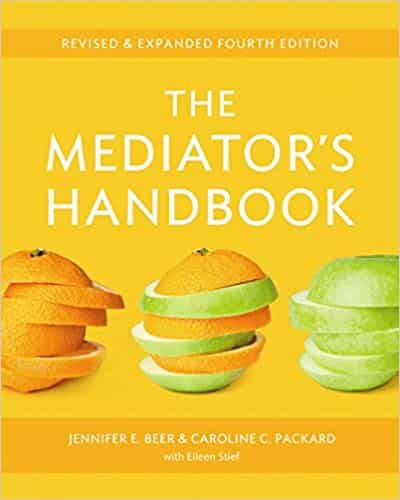
The Mediator’s Handbook is a toolkit for settling disagreements. The authors explore the full scope of mediation, from understanding the goals and standards of the practice, to identifying whether or not a situation can actually benefit from mediation, to facilitating the action and arriving at a satisfying conclusion. The book breaks down every stage of the mediation process and gives detailed tips for overseeing the discussion and responding to resistance. The Mediator’s Handbook helps neutral parties be prepared and react to turn in the discussion, and clarifies when facilitators should take control of the conversation or remain quiet. The book is a step-by-step guide that helps mediators know how to act in every circumstance.
Notable Quote: “In a broader context, mediation offers people a way to take charge of their own conflicts and solutions. Mediation processes (or even just the skills) can help communities and organizations survive their conflicts and benefit from them. Mediation can strengthen working relationships and alliances. At its best, mediation strengthens democratic, collaborative efforts to meet people’s needs more effectively.”
Read The Mediator’s Handbook.
4. Getting to Yes: Negotiating Agreement Without Giving In by Roger Fisher, William L. Ury, and Bruce Patton
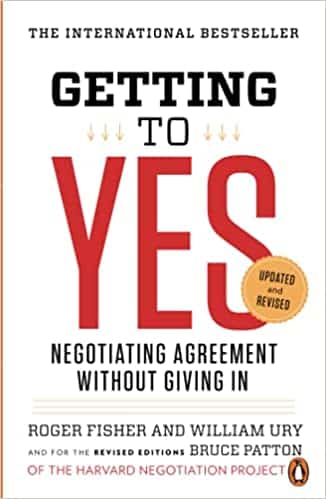
Getting to Yes is one of the all-time bestselling conflict resolution books. This guide shows leaders how to compromise without giving up too much ground. The authors draw on research from the Harvard Negotiation Project to offer up observations and best practices for brokering deals. The book recommends the optimal approach for every circumstance and shows when to give leeway and when to remain firm. Getting to Yes is a guide to settling differences without settling that offers mediators a blueprint for satisfying both sides.
Notable Quote: “Any method of negotiation may be fairly judged by three criteria: It should produce a wise agreement if agreement is possible. It should be efficient. And it should improve or at least not damage the relationship between the parties.”
Read Getting to Yes: Negotiating Agreement Without Giving In.
5. Getting to Zero: How to Work Through Conflict in Your High-Stakes Relationships by Jayson Gaddis
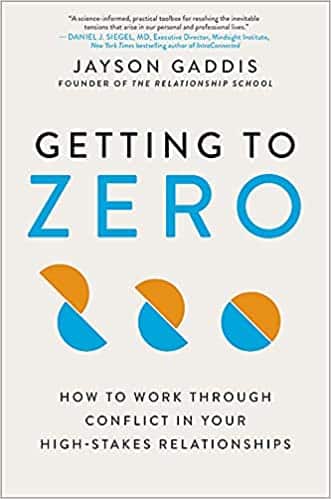
Getting to Zero is a relationship-centric guide to tackling disagreements. The book focuses on how to navigate disturbances that arise within close relationships, and how conflict can test and strengthen these social ties. Jayson Gaddis is a conflict consultant that coaches people on interpersonal issues. The book is full of his firsthand experience and wisdom and contains entertaining stories that explore the likely reasons behind conflict and the most common reactions. The guide shows how to identify and react to triggers, listen and respond in appropriate ways, and avoid roadblocks and pitfalls. Getting to Zero dissects the factors that surround conflict and offers a way to maintain and deepen your strongest relationships.
Notable Quote: “If you don’t work through adversity with other people, your relationships will never reach their potential, and you’ll never know the magic of what a strong friendship or partnership is like.”
Read Getting to Zero.
6. High Conflict: Why We Get Trapped and How We Get Out by Amanda Ripley
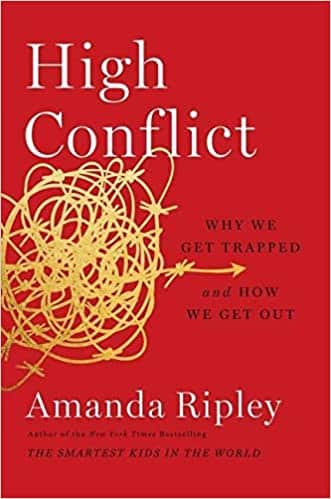
High Conflict is an exploration of divisive disputes. These kinds of confrontations create an “us vs them” mentality that resists peaceful resolution and make the conflict an unending cycle. Amanda Riply examines the elements that create these situations and identifies effective methods of escaping these patterns and impulses. The book draws on some of the most extreme examples of high conflicts and shows how participants were able to overcome the odds and move from combatants to collaborators. High Conflict feels especially relevant in the current climate, and can offer readers tools for bridging differences and finding common ground with the most seemingly opposite opponents.
Notable Quote: “In healthy conflict, there is movement. Questions get asked. Curiosity exists. There can be yelling, too. But healthy conflict leads somewhere. It feels more interesting to get to the other side than to stay in it. In high conflict, the conflict is the destination. There’s nowhere else to go.”
Read High Conflict.
7. Conflict Resolution Playbook: Practical Communication Skills for Preventing, Managing, and Resolving Conflict by Jeremy Pollack
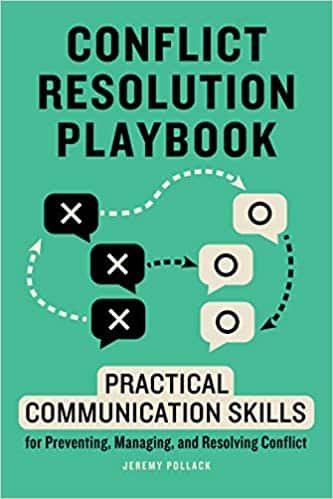
Conflict Resolution Playbook is an instructional manual for dealing with disputes. The text puts an emphasis on communication, and shows how language can be key to getting desired results. This comprehensive guide prepares mediators for potential responses and common problems such as defensiveness to criticism, gas-lighters, and conflicts with superiors. The book offers strategies and tips for letting go of resentment, setting clear expectations with staff, remaining calm and open-minded in the heat of disagreement. Conflict Resolution Playbook teaches readers how to make listeners more receptive and willing to work together to solve the problem.
Notable Quote: “Simply put, with trust comes peace, and with distrust comes avoidance and/or conflict. In this context, trust implies our core needs are supported; distrust implies our core needs are threatened.”
Read Conflict Resolution Playbook.
8. Never Split the Difference: Negotiating As If Your Life Depended On It by Chris Voss and Tahl Raz
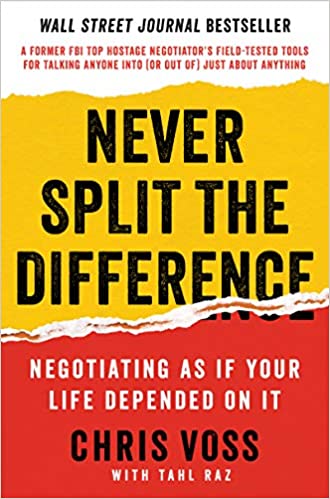
Never Split the Difference is one of the best negotiation and conflict resolution books for work. Written by a former FBI hostage negotiator, this guide gives tested techniques for diffusing tension and gaining the upper hand in high-pressure situations. From establishing rapport and trust, to being mindful about language, to being persuasive without being pushy, the author offers specific and actionable advice on conduct in the heat of conflict. The book preaches an approach that appeals to the human psyche and lays out strategies with reliable results. The lessons drawn from the author’s experiences have practical applications in the workplace and can help leaders skillfully solve the most fraught confrontations.
Notable Quote: “The beauty of empathy is that it doesn’t demand that you agree with the other person’s ideas.”
Read Never Split the Difference.
9. The No Asshole Rule: Building a Civilized Workplace and Surviving One That Isn’t by Robert I. Sutton
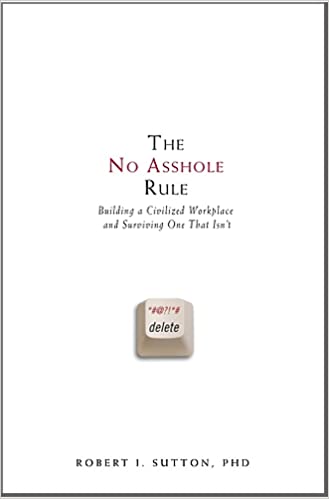
The No Asshole Rule is one of the top books on conflict resolution in the workplace. This guide not only addresses how to respond to immediate conflict, but how to prevent unnecessary conflict by building a culture that does not tolerate jerks. The book shows how to address problematic and toxic behavior and create an atmosphere that prioritizes respect. The No Asshole Rule shows leaders how to reduce harm and achieve harmony by setting high standards for staff and confronting team members who violate behavioral norms.
Notable Quote: “As much as I believe in tolerance and fairness, I have never lost a wink of sleep about being unapologetically intolerant of anyone who refuses to show respect for those around them.”
Read The No Asshole Rule.
10. Crucial Accountability: Tools for Resolving Violated Expectations, Broken Commitments, and Bad Behavior by Kerry Patterson, Joseph Grenny, et al
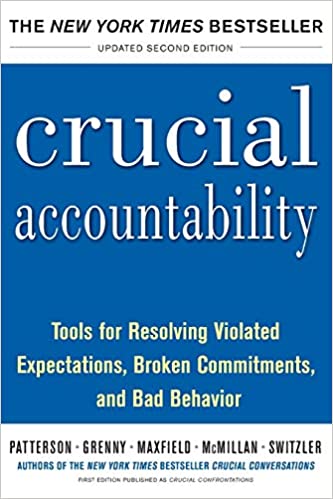
Crucial Accountability comes from the same authors of Crucial Conversations. This installment drives at the heart of the behaviors that lead to conflict. The book explores the behaviors that serve as catalysts to conflict. The authors emphasize the need for accountability conversations, or discussions that get at the root of responsibility for conflicts. The book shows how to address issues without casting blame or sparking defensiveness. As the title promises, the book provides tools for mending broken trust and disappointment, and returning to a place of mutual respect and dependability.
Notable Quote: “Most of us have been disappointed or treated poorly by others and have experienced both ineffective options– (1) perpetuating the problem by saying nothing and (2) speaking up and creating a new problem. As a result, we feel trapped between two bad alternatives. We would like to say something– but not something abrasive or rude that could lead to an altercation.”
Read Crucial Accountability.
11. HBR Guide to Dealing with Conflict by Amy Gallo
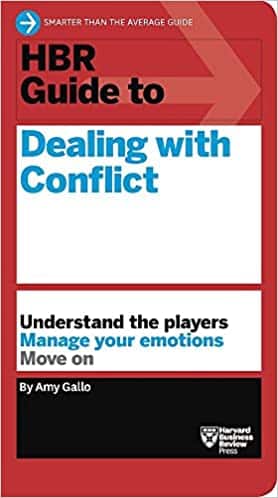
HBR Guide to Dealing with Conflict offers a crash course in dealing with workplace conflict. The book shows that conflict is inevitable and can actually be beneficial. According to this guide, the mark of a healthy workplace is not one where teammates never disagree, but rather one where discrepancies are resolved with tact and care. This guide provides leaders with a roadmap for dealing with conflict, and breaks down each stage of the conflict in depth. The book prescribes practical actions to handle disputes and identifies the different elements at play in every situation. The author also peppers anecdotes from her own experience into the narrative to illustrate effective or ineffective methods of approaching issues.
Notable Quote: “…when handled well, conflict can have positive outcomes: It can help you be more creative, spark new ideas, and even strengthen bonds with your coworkers.”
Read HBR Guide to Dealing with Conflict.
12. 101 Tough Conversations to Have With Employees: A Manager’s Guide To Addressing Performance, Conduct, And Discipline Challenges by Paul Falcone
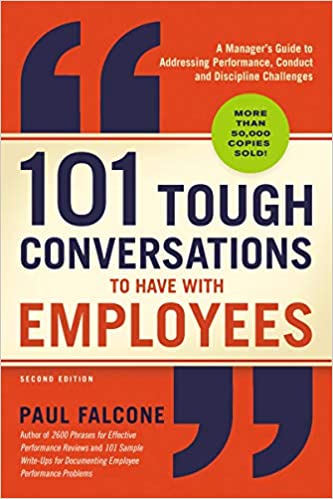
101 Tough Conversations to Have with Employees is one of the best conflict resolution books for managers. This reference guide outlines the most common employee issues and gives tips on how to handle them. Chapters touch on topics ranging from poor hygiene to underperformance to harassment and more. The book describes ways to have solution-centric conversations about issues and gives tips for approaching problems on a direct managerial and a corporate level. The guide outlines ways to conduct and document conversations in a way that gets results without putting the company or manager in danger. 101 Tough Conversations to Have with Employees is a playbook for addressing workplace conflict as a supervisor.
Notable Quote: “Where do communication, effective leadership, and motivation usually fall apart? Once a manager starts sweeping things under the rug or leaves ongoing challenges unaddressed.”
Read 101 Tough Conversations to Have With Employees.
13. Humble Inquiry: The Gentle Art of Asking Instead of Telling by Edgar H. Schein and Peter A. Schein
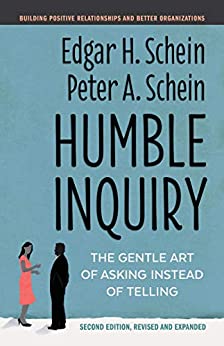
Humble Inquiry is a masterclass in the art of dialogue. The book shows how to listen to the other side in an argument and ask questions that uncover important information. One of the most critical parts of conflict resolution is making the other party feel heard, safe, and respected, and this book advocates for that very approach. The authors show how asking questions can uncover the roots of a disagreement and help to build more positive relationships. Humble Inquiry lays down a framework for solving issues by listening.
Notable Quote: “Trust in the context of a conversation is believing that the other person will acknowledge me, not take advantage of me, not embarrass or humiliate me, tell me the truth, and, in the broader context, not cheat me, work on my behalf, and support the goals we have agreed to.”
Read Humble Inquiry.
Final Thoughts
Conflict resolution is a skill that does not come naturally to most folks. In fact, the fight-or-flight response often causes individuals to either react emotionally or avoid arguments altogether. However, conflict is a part of any relationship and working through issues is a critical component of the team building process. Reading books on conflict resolution helps professionals prepare for when tense circumstances arise and behave more mindfully and strategically instead of lashing out on instinct. These works can help individuals adopt mindsets and techniques that reveal the reason behind the spats and steer the situation towards a peaceful resolution.
For more reading recommendations, check out these lists of change management books and employee experience books.
